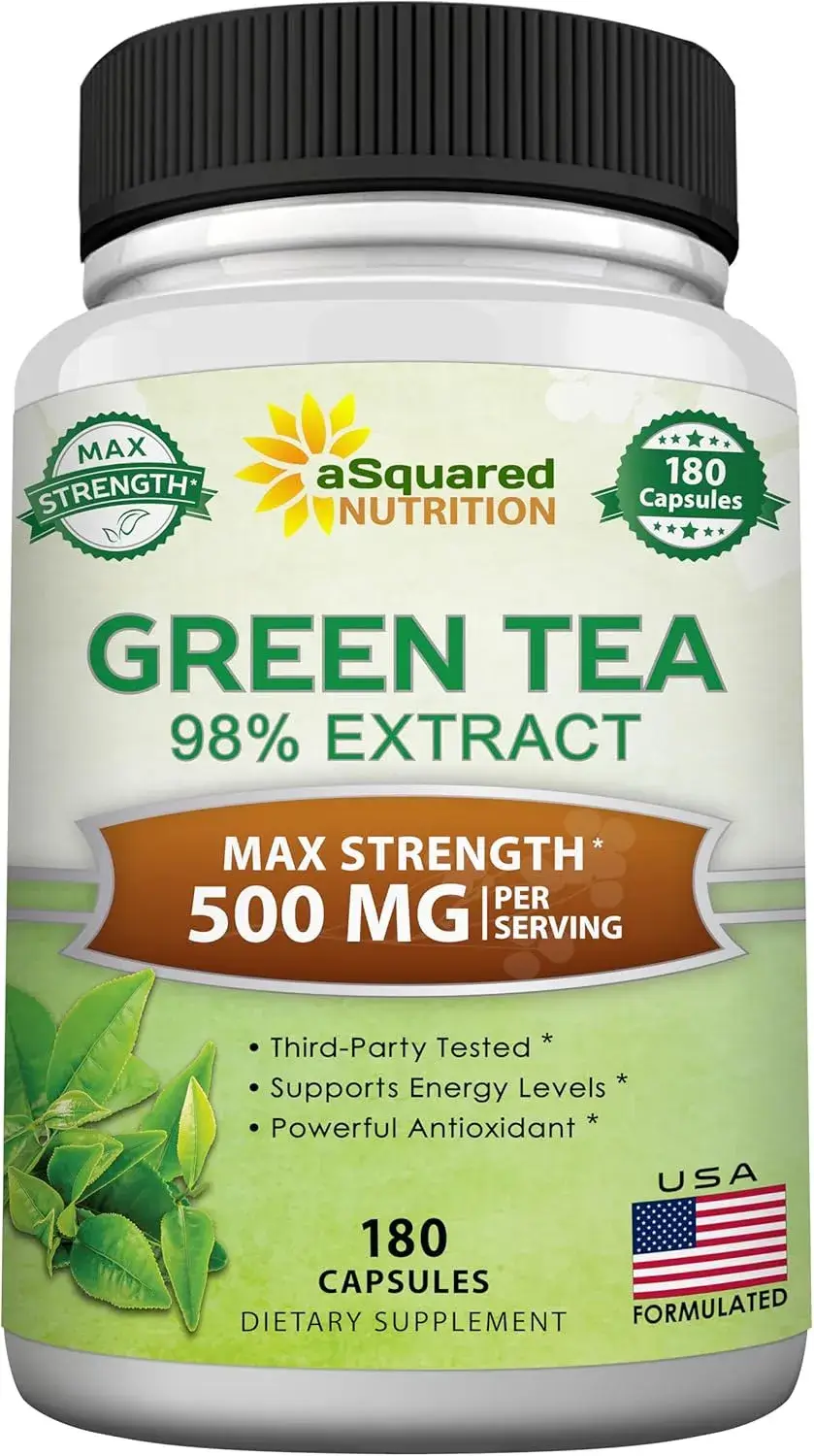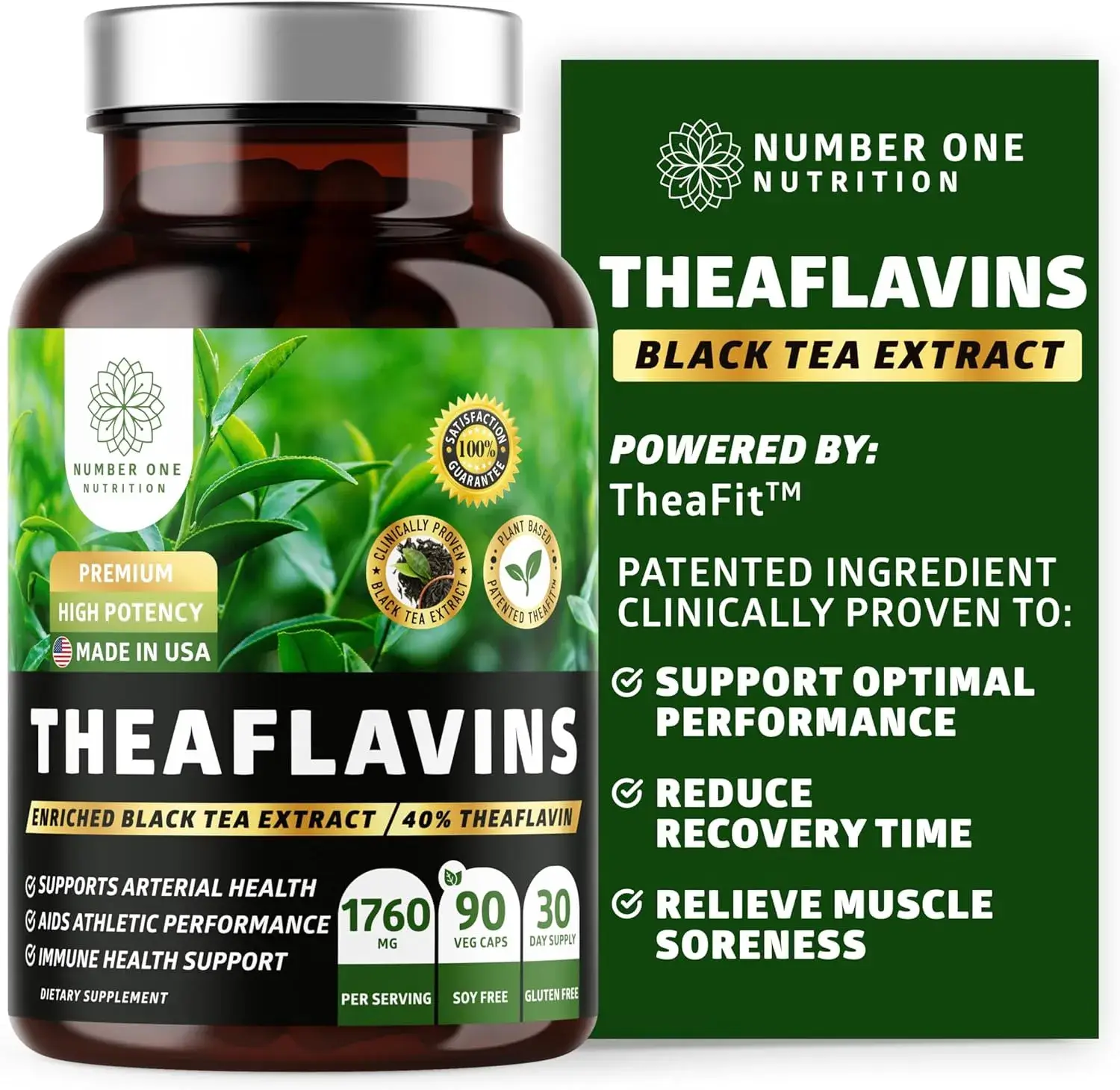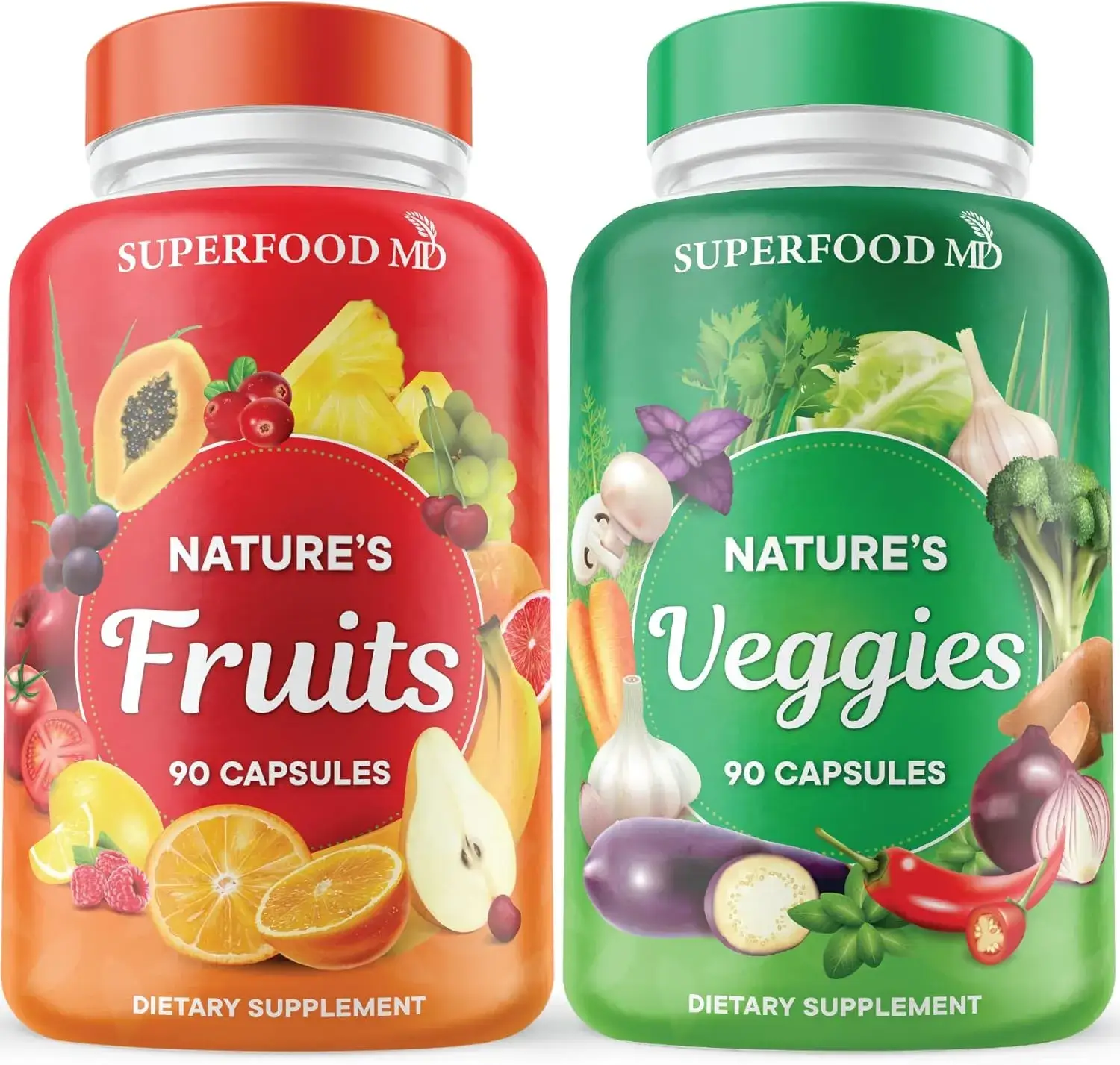Table of Contents
Ginseng tea is good for what exactly? This powerful herbal remedy has been used in traditional Chinese medicine for centuries, and the science is finally catching up to what ancient healers always knew.
After testing numerous natural supplements over the years, I’ve found that the benefits of ginseng tea are truly impressive. Studies show it can significantly improve chronic fatigue symptoms in just 15 days, while also offering remarkable support for blood sugar regulation. Additionally, ginseng tea health benefits extend to weight management, with research demonstrating considerable reductions in body weight after consuming it twice daily for eight weeks. What is ginseng tea good for besides energy? According to a 2016 meta-analysis, regular drinkers may have a 16% lower chance of developing cancer.
What does ginseng tea taste like? We’ll cover that too, but first, let’s explore the 15 science-backed benefits that make this ancient remedy so valuable in 2025. From boosting energy to supporting heart health, the evidence behind this powerful herb might surprise you. In fact, one study found that people given ginseng experienced less mental and physical fatigue than those taking a placebo, making it a natural solution worth considering.
Boosts Energy and Reduces Fatigue
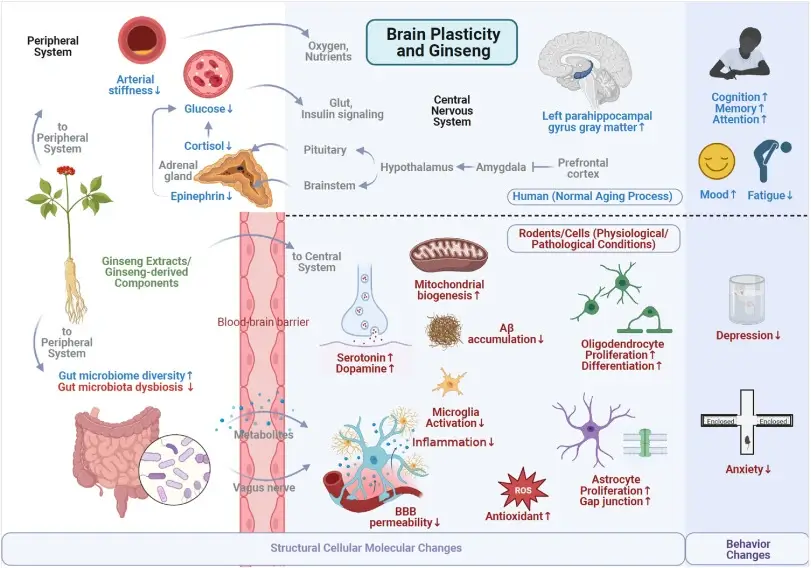
For centuries, herbal enthusiasts have turned to ginseng tea when looking for a natural energy booster. The reputation of this powerful herb as a fatigue-fighter isn’t just based on tradition—modern science has begun to validate these claims through rigorous research.
Scientific Evidence on Ginseng Tea and Energy
Research consistently demonstrates ginseng’s effectiveness against fatigue. A 2018 review examining 10 different studies concluded that ginseng could significantly improve symptoms of chronic fatigue syndrome compared with a placebo, with benefits appearing in as little as 15 days. Furthermore, a meta-analysis of four randomized controlled trials found statistically significant evidence that ginseng supplements reduce fatigue (standardized mean difference = 0.34).
One particularly telling study involved 90 participants who received different dosages of ginseng over one month. The results clearly showed that individuals given ginseng experienced less mental and physical fatigue compared to those taking a placebo. Even for cancer patients, who often struggle with extreme fatigue, high doses of American ginseng (2,000 mg) produced a 20-point improvement on a standardized 100-point fatigue scale after eight weeks of use.
How Ginseng Tea Helps with Fatigue
The energy-boosting effects of ginseng stem primarily from its active compounds called ginsenosides. These powerful substances have been shown to reduce inflammatory cytokines and help regulate cortisol levels—your body’s primary stress hormone.
Traditionally, Asian ginseng is described as more “yang” (energizing), whereas American ginseng offers slightly more “yin” (calming) properties. Nevertheless, both varieties work by tonifying or strengthening what traditional Chinese medicine calls “qi”—your life force energy.
In physical terms, ginseng appears to enhance endurance by improving several physiological markers. Studies have shown positive effects on creatine kinase levels (indicating reduced muscle damage), lactate accumulation (delaying fatigue), and VO2 max (improving oxygen utilization).
Recommended Usage for Energy Boost
To maximize ginseng tea’s energy-boosting benefits:
- Start with a standard daily dosage between 1,000-3,000 mg depending on the product form
- Allow time for effects to build—most people notice improvements within 2-4 weeks of consistent use
- Respect duration limits: Asian ginseng should not be used beyond three months, Siberian ginseng for no more than two months, and American ginseng for up to one month at a time
- Avoid combining with caffeine or other stimulants, as the combined effect may make you “too wired”
Many users find that regular ginseng tea consumption gradually stabilizes energy levels throughout the day, unlike the peaks and crashes associated with caffeine.
Enhances Cognitive Function
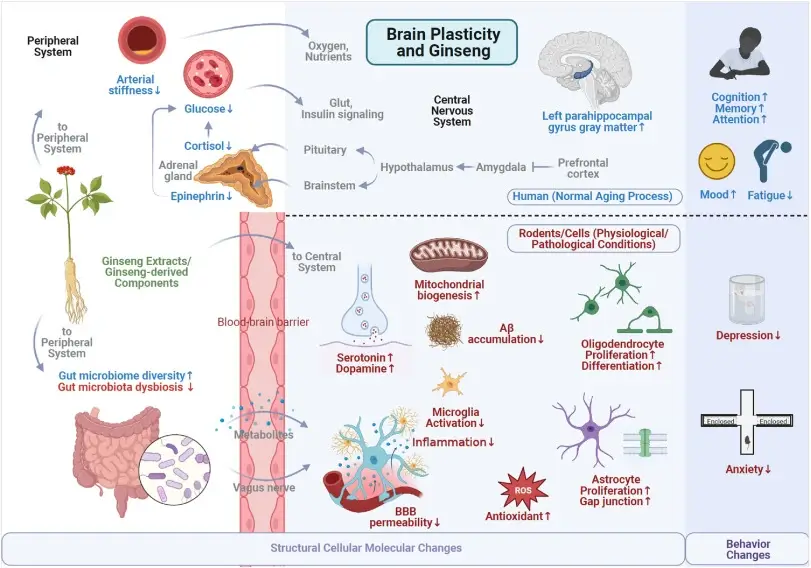
Beyond its energy-boosting properties, ginseng tea offers remarkable cognitive benefits that have caught the attention of researchers worldwide. As someone who values mental sharpness, I’ve found the research on ginseng’s brain-enhancing effects particularly compelling.
Scientific Evidence on Brain Function
Studies consistently show that ginseng improves brain function and may help prevent cognitive decline. In one observational study involving 6,422 elderly Koreans, those who consumed ginseng for more than five years demonstrated significantly higher cognitive scores compared to non-users. This relationship remained strong even after controlling for factors like age, education, and genetics.
Research using event-related potential (ERP) tests revealed that after just two weeks of red ginseng supplementation (4,500 mg daily), participants showed decreased P300 latency—indicating faster cognitive processing speed. Moreover, another study found that taking Korean red ginseng (200 mg/day) significantly improved working memory and mental arithmetic.
How Ginseng Tea Supports Memory and Focus
Ginseng enhances cognitive performance through multiple mechanisms. Essentially, it stimulates brain cells, improves concentration, and supports overall cognitive activities. Ginsenosides—the active compounds in ginseng—increase protein synthesis and neurotransmitter activity in the brain.
The herb works by:
- Stimulating blood vessel formation and improving cerebral circulation
- Modulating neurotransmitters including dopamine, serotonin, and acetylcholine
- Protecting against oxidative stress and inflammation
- Enhancing brain plasticity during normal aging
For Alzheimer’s patients, clinical trials have shown encouraging results. Treatment with 4.5g/day of red ginseng produced significant improvements in cognitive function after 12 and 24 weeks.
Recommended Usage for Mental Clarity
For optimal cognitive benefits:
- Start with 1 gram daily or 500mg twice daily for stress or mental fatigue
- For severe cognitive issues, higher doses (4.5g/day) have been studied
- Consistency is key—benefits typically appear after 4-8 weeks of regular use
- Ginseng tea made from the root provides optimal cognitive enhancement
The cognitive benefits of ginseng tea make it an excellent natural option for supporting brain health as we age.
Reduces Inflammation
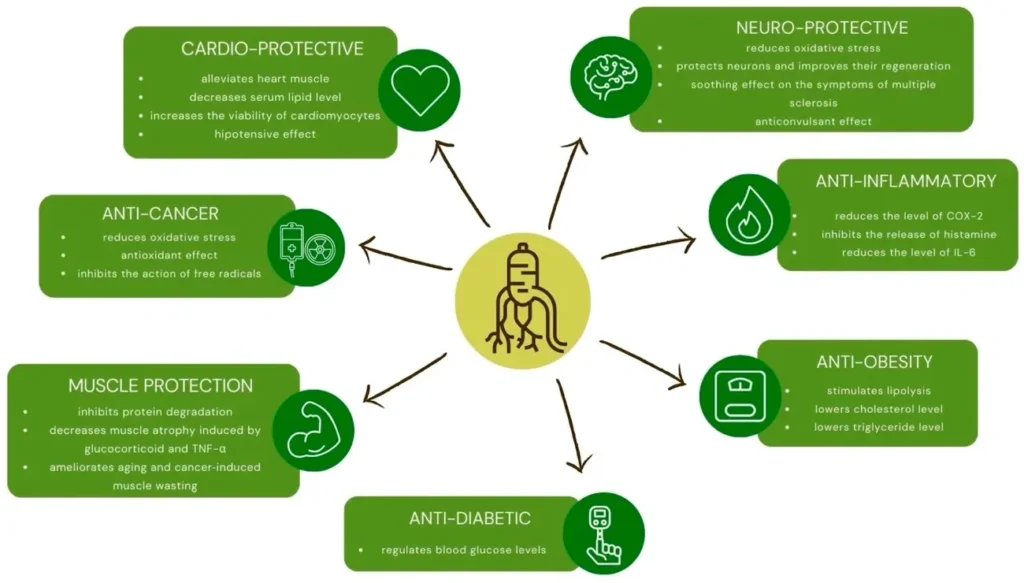
Research confirms that ginseng tea stands out for its remarkable anti-inflammatory effects. The scientific community has increasingly recognized inflammation as an underlying factor in many chronic diseases, which makes this benefit especially valuable.
Anti-inflammatory Properties of Ginseng Tea
Ginsenosides, the active compounds in ginseng, specifically target pathways in the immune system that reduce inflammation. These powerful components have been shown to have beneficial antioxidant and anti-inflammatory properties. Consequently, ginseng effectively protects against inflammatory diseases through multiple mechanisms. In a prospective cohort study of 4,364 people over 40 years old, those who used ginseng showed a significantly lower risk of cancer (relative risk: 0.40), which researchers partially attribute to its anti-inflammatory effects.
How Ginseng Tea Reduces Inflammatory Markers
A 2019 meta-analysis of seven randomized controlled trials demonstrated that ginseng supplementation significantly lowered key inflammatory markers, including interleukin-6 and tumor necrosis factor-alpha. Indeed, ginseng decreases inflammatory cytokine production through several pathways:
- Suppressing airway hyperresponsiveness in asthma models
- Protecting against bacterial septic responses
- Reducing cerebral inflammation after ischemia
- Ameliorating arthritis symptoms
- Decreasing intestinal inflammation in colitis
Specifically, ginsenosides Rg3, Rd, and Rb1 all showed remarkable abilities to block inflammatory signaling pathways including NF-κB and MAPK. Furthermore, research indicates that ginseng’s anti-inflammatory action may underlie its effectiveness against conditions ranging from neuroinflammatory diseases to rheumatoid arthritis.
Recommended Dosage for Inflammation
For managing inflammatory conditions, dosage recommendations vary based on the specific form and concentration of ginseng:
First, start with standard daily dosages of 1-3 grams of ginseng root extract. Subsequently, increase or adjust based on individual response. Clinical studies typically used:
- 200-500 mg daily for general anti-inflammatory effects
- 1-2 grams daily for autoimmune conditions
- 4.5 grams daily for severe inflammatory disorders
Despite its benefits, it’s important to note that ginseng may interact with certain medications, particularly blood thinners like warfarin, hence consultation with healthcare providers is essential before starting supplementation.
👉 Discover the Top Premium Ginseng Tea Experience Today 👈
Supports Immune System
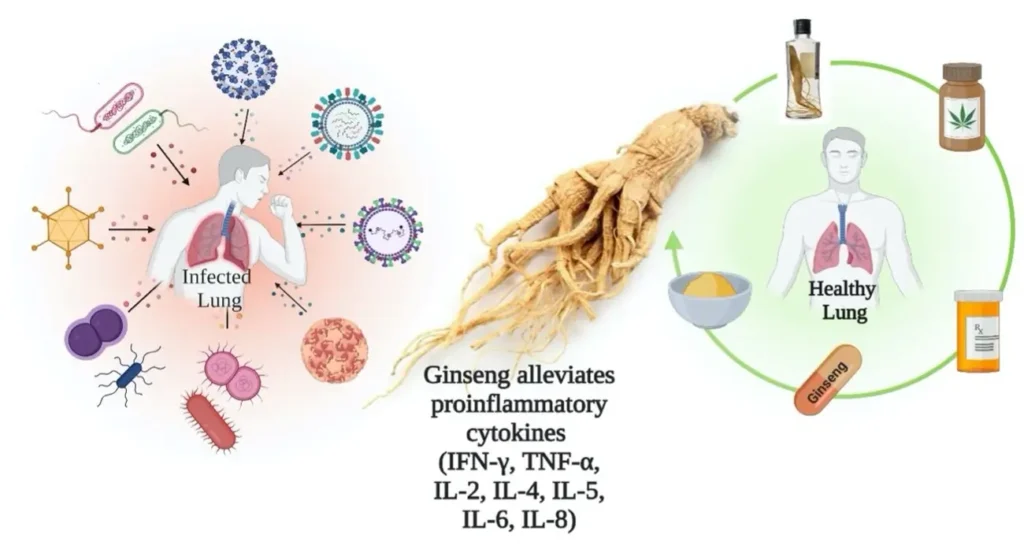
Among the many health advantages of ginseng tea, its powerful immune-boosting properties stand at the forefront of scientific research. As an immunomodulator, ginseng has historically been used to strengthen resistance against illness—a claim now supported by rigorous clinical studies.
Ginseng Tea and Immune Cell Activity
Primarily, ginseng enhances immune function by activating several key immune cell types. Clinical trials have shown that Korean Red Ginseng significantly increases T cells, B cells, and white blood cell counts after just eight weeks of consumption. In one study, the B cell distribution notably increased by 2.07% after participants took Korean Red Ginseng for two months.
Ginseng polysaccharides stimulate macrophages—our body’s primary defense cells—to improve their phagocytic activity, essentially making them better at engulfing harmful microbes. Even more impressive, oral administration of ginseng extract in healthy adults improved phagocytic activity in a controlled clinical trial.
Natural killer (NK) cells, crucial for fighting infections and cancer, also respond positively to ginseng. Research demonstrates that both aqueous extract and ginsenoside Rg1 enhance natural killing activity regardless of the host’s immune condition.
How Ginseng Tea Helps Prevent Illness
Firstly, ginseng tea strengthens respiratory defenses. As Dr. Nguyen notes, “Ginseng can tonify the lungs and make them stronger, which can be good for people who have a cough or asthma”.
A clinical trial involving 227 volunteers found that daily administration of ginseng extract for 12 weeks enhanced the effectiveness of influenza vaccines, resulting in lower incidence of colds and flu, higher antibody levels, and increased natural killer cell activity. Another study of 75 patients with acute bronchitis showed faster bacterial clearance when antibiotics were combined with ginseng.
Best Practices for Immune Support
For optimal immune support, consider these evidence-based recommendations:
- Take 100 mg of standardized ginseng extract twice daily—this dosage increased T helper cells and total lymphocyte counts in clinical studies
- During cold and flu season, drink ginseng tea daily as preventive support
- For maximum benefit, choose Asian ginseng over American ginseng for stronger immune effects
- Continue use for at least 8-12 weeks, as studies show significant immune cell increases within this timeframe
Korean Red Ginseng has officially been recognized by Korea’s Ministry of Food and Drug Safety for improving immunity, alongside five other health functions.
Improves Erectile Dysfunction and Libido
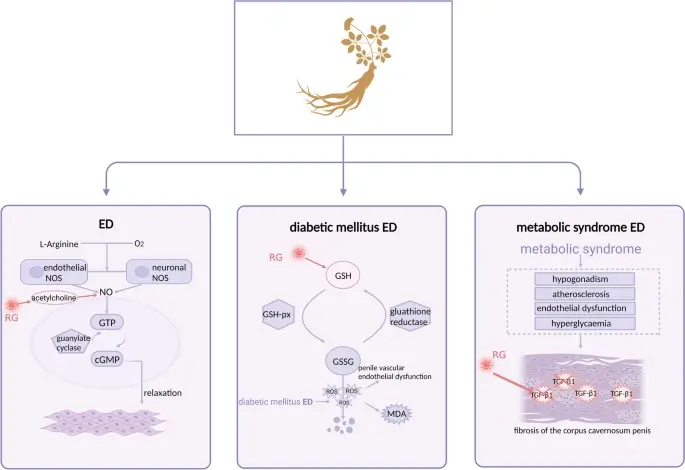
Sexual wellness represents yet another area where ginseng tea offers substantial benefits. Traditional healers have long valued this herb for its ability to enhance sexual function, and modern science now provides solid evidence supporting these claims.
Ginseng Tea and Sexual Health
Ginseng improves sexual function through several biological mechanisms. The active compounds in ginseng, called ginsenosides, induce nitric oxide synthesis in endothelial cells and perivascular nerves. This nitric oxide release causes smooth muscle relaxation, allowing increased blood flow into the erectile bodies (corpus cavernosum), which facilitates erections. Remarkably, ginsenosides also enhance vascular smooth muscle sensitivity to nitric oxide.
Beyond physical effects, ginseng simultaneously influences hormonal pathways critical for sexual health. Research shows that ginseng extract significantly increases plasma levels of testosterone, follicle stimulating hormone, and luteinizing hormone. This hormonal impact helps explain its beneficial effects on both erectile function and libido.
Clinical Trials on ED and Libido
Multiple clinical studies confirm ginseng’s effectiveness for erectile dysfunction. In one double-blind, placebo-controlled study, 45 men with moderate to severe ED experienced significant improvements in erectile performance and sexual satisfaction after taking 900 mg of Korean red ginseng three times daily for eight weeks. Likewise, another study involving 60 men who took 1,000 mg three times daily for 12 weeks reported marked improvement in erectile function including rigidity, penetration, and maintenance.
Looking at broader data, a meta-analysis of seven randomized clinical trials revealed that men taking ginseng were 2.4 times more likely to report improved erections compared to placebo groups. Interestingly, ginseng may improve men’s self-reported ability to have intercourse, corresponding to 321 more men per 1,000 reporting this ability.
How to Use Ginseng Tea for Libido
For optimal results with sexual function:
- Consume 1,000-3,000 mg daily, divided into multiple doses
- Continue treatment for at least 8-12 weeks
- Choose Korean red ginseng for strongest effects on ED
- Maintain consistent use for maximum benefit
👉 Unlock the Best Energy Boost with Premium Ginseng Tea 👈
Helps Manage Blood Sugar Levels
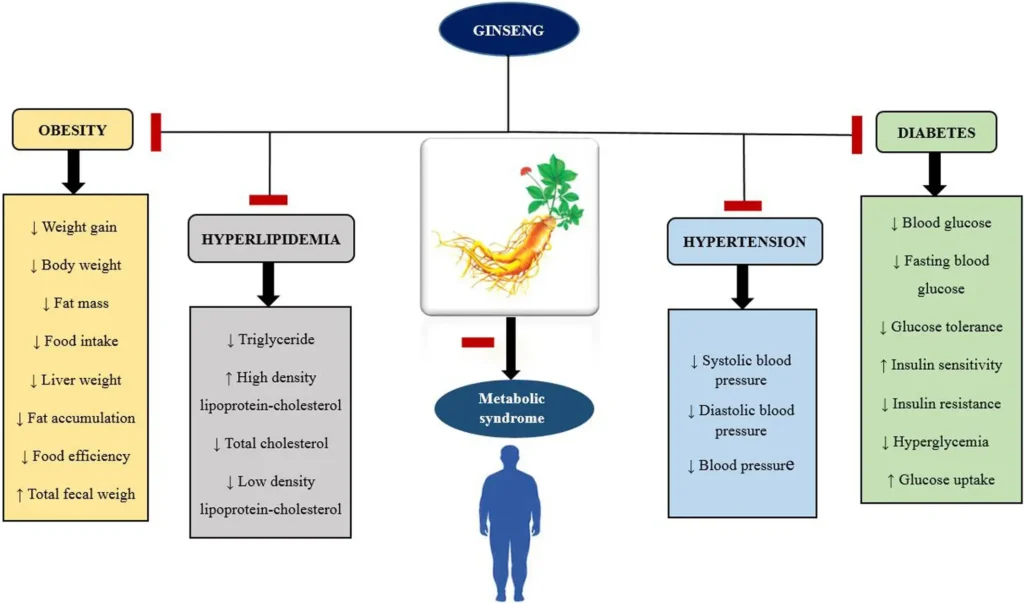
Managing blood sugar levels effectively remains a daily challenge for millions worldwide. Fortunately, recent scientific research highlights ginseng tea as a promising natural aid for glycemic control.
Ginseng Tea and Insulin Sensitivity
Ginseng works primarily by enhancing how our bodies process glucose. Studies show that both American and Asian ginseng improve pancreatic cell function, boost insulin production, and enhance the uptake of blood sugar in tissues. This triple-action approach helps prevent glucose from accumulating in the bloodstream. Additionally, ginseng decreases insulin resistance through AMPK activation and increases glucose transporter 4 (GLUT4) expression in liver and skeletal muscle.
Studies on Diabetes and Ginseng
The evidence supporting ginseng tea’s blood sugar benefits continues to grow. A meta-analysis of sixteen randomized controlled trials found that ginseng significantly reduced fasting blood glucose by 0.31 mmol/L compared to control groups. In another compelling study, Korean red ginseng (5g/day) demonstrated significant improvements in both serum and whole blood glucose levels in patients with impaired fasting glucose, impaired glucose tolerance, or newly diagnosed type 2 diabetes.
Interestingly, different ginseng preparations yield varied results. One eight-week study using ginsam (enriched with ginsenoside Rg3) showed notable reductions in both HbA1c levels and fasting blood glucose by 0.56% and 21.40 mg/dL respectively.
Best Time to Drink Ginseng Tea for Blood Sugar
For optimal blood sugar management:
- Consume ginseng tea 40 minutes before meals to help regulate post-meal glucose spikes
- Maintain consistent usage—significant improvements typically appear after 8-12 weeks
- Standard effective dosage ranges from 1-5 grams daily, with Korean red ginseng showing strongest effects at 5g/day
- Morning consumption may help establish better glucose regulation throughout the day
The scientific consensus suggests that ginseng tea benefits are most pronounced for those with type 2 diabetes rather than individuals with prediabetes or healthy adults. Nevertheless, its safety profile makes it a valuable consideration for anyone concerned about maintaining healthy blood sugar levels.
Supports Mental Health and Reduces Anxiety
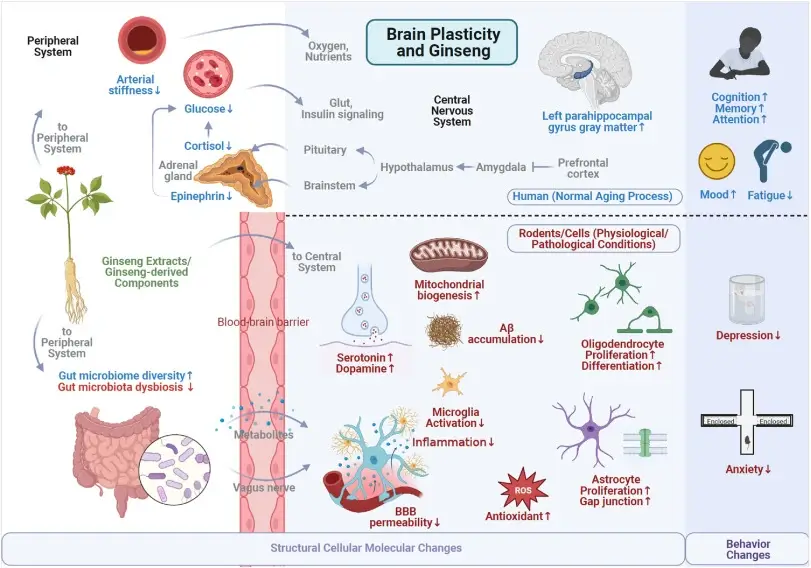
In the realm of natural mood enhancers, ginseng tea stands out as a scientifically-backed remedy for psychological wellness. Stress and anxiety affect millions worldwide, yet many remain unaware of what ginseng tea is good for in terms of mental health support.
Ginseng Tea for Depression and Anxiety
Ginseng effectively suppresses stress—a major cause of depression—with efficacy comparable to commercial antidepressants like fluoxetine. Animal studies consistently demonstrate its antidepressant capabilities, making it a promising natural alternative. One particular study examined 30 healthy individuals who consumed 200 mg of ginseng daily for four weeks, resulting in measurable improvements in mental health, social functioning, and overall mood.
Interestingly, ginseng’s anti-inflammatory and antioxidative properties play crucial roles in protecting our brains against oxidative stress and damage. This protection may explain why people taking ginseng often report reduced anxiety symptoms, improved sleep quality, and elevated mood states.
Neurotransmitter Regulation by Ginseng
The cognitive benefits of ginseng tea extend beyond simple mood enhancement. Ginseng helps regulate neurotransmitters that modulate our emotional states, creating a balanced biochemical environment conducive to mental wellness. As an adaptogen, it shows superior regulation of stress compared to other similar herbs.
Upon facing stressful situations, ginseng improves our response by regulating the hypothalamic-pituitary-adrenal (HPA) axis—the body’s primary stress response system. This regulation makes ginseng potentially valuable for treating various conditions associated with cortisol hypersecretion, including depression, hypertension, and post-traumatic stress disorder.
How to Use Ginseng Tea for Mental Health
For optimal mental health benefits:
- Start with 200-400 mg daily for improved calmness and mental function
- American ginseng offers more calming, relaxing effects than its Asian counterpart
- Avoid combining with caffeine or other stimulants to prevent overstimulation
- Allow 4-8 weeks of consistent use for maximum benefits
The “nourishing” effect of American ginseng appears particularly beneficial for mental wellness, offering a gentler approach to anxiety management than stimulating varieties.
Promotes Heart Health
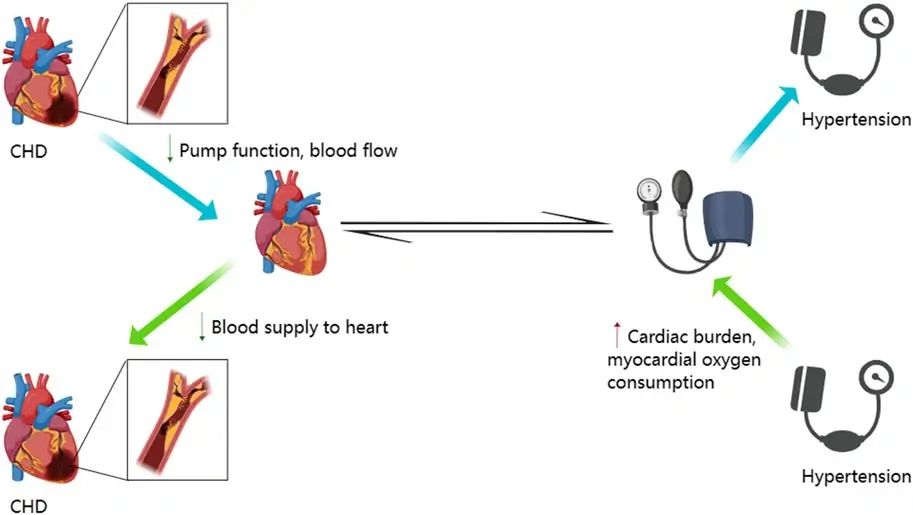
The cardiovascular system receives remarkable support from ginseng tea, making it a valuable addition to heart health regimens. As research advances, scientists are uncovering how this ancient remedy provides protection against various aspects of heart disease.
Cardiovascular Benefits of Ginseng Tea
Ginsenosides, the primary active compounds in ginseng, deliver multi-faceted cardiovascular protection through several mechanisms. Initially, these compounds improve blood circulation via vasodilation effects, enhancing blood flow throughout the body. Studies show that ginseng protects heart tissue from damage and offers cardioprotective benefits through antioxidation, improved vasomotor function, reduced platelet adhesion, and beneficial effects on ion channels. Coupled with these benefits, ginseng increases cardiac contractility without altering heartbeat rate, potentially improving cardiac function without causing arrhythmias.
How Ginseng Tea Affects Blood Pressure and Cholesterol
Contrary to earlier concerns, research reveals that ginseng normalizes blood pressure—raising low blood pressure and lowering high blood pressure. A meta-analysis of 11 randomized controlled trials found that daily ginseng capsules taken for 8-12 weeks reduced systolic blood pressure by approximately 3 points and diastolic pressure by 2 points.
Regarding cholesterol, Korean red ginseng demonstrated significant improvements in postmenopausal women with hypercholesterolemia. After just 4 weeks, the ginseng group showed greater reductions in cholesterol levels (−148.3 ± 261.1 nmol/mL) compared to the placebo group (−23.0 ± 220.5 nmol/mL). Analogous to these findings, other studies confirm ginseng’s ability to reduce total cholesterol, triglycerides, and LDL-cholesterol.
Recommended Intake for Heart Health
For optimal cardiovascular benefits:
- Consume 200-400 mg of ginseng daily for general heart health
- For specific conditions like hypercholesterolemia, doses of 1-3 grams daily may be more effective
- Korean red ginseng shows stronger cardiovascular benefits at lower doses
- Allow 4-8 weeks of consistent use for measurable improvements in blood pressure and cholesterol
At the present time, mounting evidence indicates that regular consumption of ginseng tea represents a simple yet effective approach to supporting long-term heart health.
👉 Indulge in Premium Ginseng Tea for Ultimate Vitality Booster 👈
Aids in Weight Loss
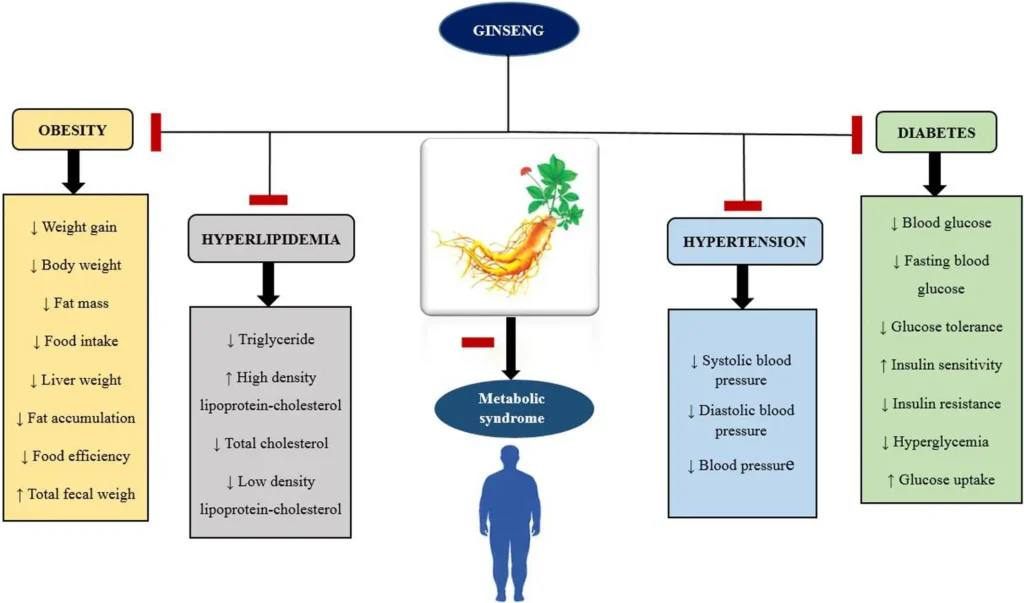
Weight management represents a key area where ginseng tea shows promising results. With obesity linked to numerous health conditions, many people seek natural solutions to complement diet and exercise.
Ginseng Tea and Metabolism
Primarily, ginseng tea supports weight loss through its ability to boost metabolism and enhance fat burning. The bioactive compounds in ginseng called ginsenosides activate the adenosine monophosphate-activated kinase (AMPK) pathway—a master regulator that switches metabolism from anabolism to catabolism. Through this mechanism, ginseng effectively increases energy expenditure and reduces energy intake.
Ginsenoside Rb1, a major active compound in ginseng, has demonstrated particularly effective anti-obesity properties. It works by reducing the expression of inflammatory markers such as p-IκB kinase and interleukin-6 in the hypothalamus. Furthermore, ginseng increases the expression of cholecystokinin (CCK)—a hormone that acts as a natural hunger suppressant.
Scientific Studies on Weight Reduction
Clinical evidence supporting ginseng’s weight loss effects continues to grow. In one notable study, middle-aged Korean women who consumed 4.0 grams of ginseng root extract daily for eight weeks experienced significant reductions in body weight. Additional research shows that ginseng and its compounds decrease food intake, adipose tissue mass, and overall body weight without altering food consumption in high-fat diet mice.
In animal studies, ginseng supplementation consistently reduced total fat storage, with Ginsenosides Rb1, Rd, Re, and Rg1 all showing varying degrees of effectiveness. Most impressively, these compounds normalized body weight and fat mass in rats fed high-fat diets.
How to Incorporate Ginseng Tea in a Weight Loss Plan
For optimal weight loss results:
- Start with 1-2 cups of ginseng tea daily, preferably before meals
- Consider pairing with exercise for synergistic effects, as natural products combined with physical activity may increase bioavailability
- Aim for consistency—most studies showing significant results used ginseng for 8-12 weeks
- For maximum benefits, choose products containing Ginsenoside Rb1, which shows the strongest anti-obesity activity
Above all, remember that ginseng tea works best as part of a comprehensive approach to weight management that includes proper nutrition and regular physical activity.
Improves Skin Health and Anti-Aging
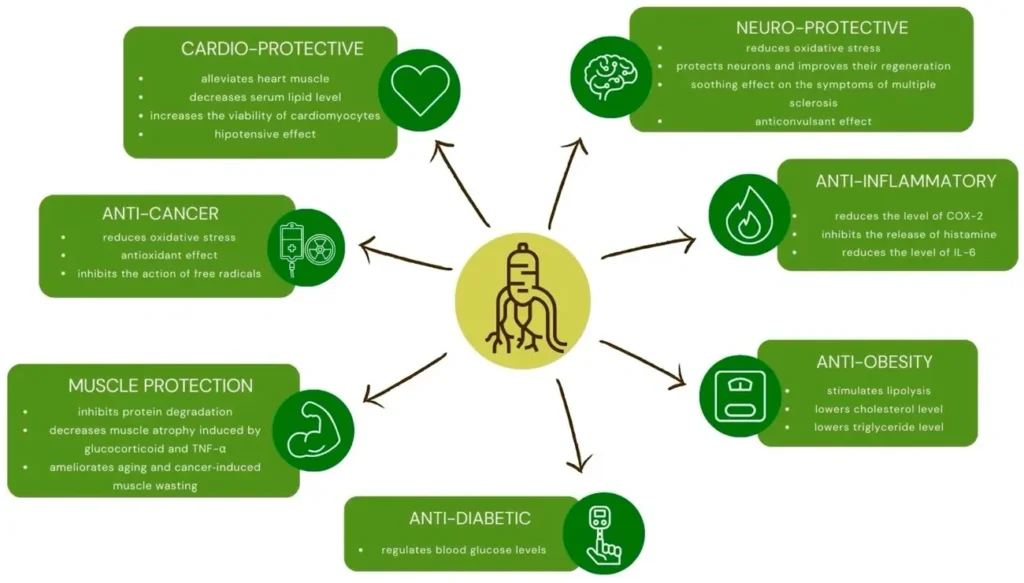
The skin-rejuvenating properties of ginseng tea represent one of its most visible benefits. Beauty enthusiasts and dermatologists alike have discovered what many Asian cultures have known for centuries—this powerful herb offers remarkable anti-aging effects through multiple biological pathways.
Ginseng Tea for Skin Elasticity
Clinical research confirms ginseng’s ability to strengthen skin structure. A 2015 study published in the Rejuvenation Research Journal found that ginseng extract significantly reduced wrinkle appearance. This occurs primarily because ginseng increases collagen formation and tightens skin by enhancing blood vessel circulation.
Correspondingly, Korean red ginseng treatment restores the viscoelasticity of skin by affecting cellular stiffness and collagen protein synthesis. The expression of procollagen type VII increased dramatically with Korean Red Ginseng treatment, reaching levels 8.8-fold higher than control groups. This protein is crucial for maintaining the junction between the epidermis and dermis, explaining why clinical trials for The Face Cream Mask with ginseng extract showed a 75% visible reduction in fine lines and 79% reduction in wrinkles.
Antioxidant Effects on Skin
Ginseng contains potent antioxidants including ginsenosides and flavonoids that protect against oxidative stress caused by free radicals. These compounds effectively shield skin from environmental pollutants, UV radiation, and stress—all major contributors to premature aging.
Concurrently, ginseng provides these key skin benefits:
- Enhanced blood circulation that nourishes skin cells and reduces dullness
- Reduced inflammation that soothes irritated skin and diminishes redness
- Balanced oil production that helps manage acne and t-zone oiliness
In user trials for ginseng-infused skincare, participants experienced a remarkable 164% improvement in skin hydration after 12 weeks.
How to Use Ginseng Tea for Skin Benefits
For internal benefits, regular consumption of ginseng tea allows you to absorb its skin-supporting nutrients from within. Meanwhile, topical applications provide direct benefits. For optimal results, consider these approaches:
Incorporate ginseng essence or face masks into your weekly skincare routine. Evidently, fermented red ginseng products offer even more effective wrinkle reduction and enhanced whitening compared to unfermented varieties. Given these points, ginseng delivers both immediate and long-term improvements to skin texture, hydration, and overall appearance.
Supports Hair Growth
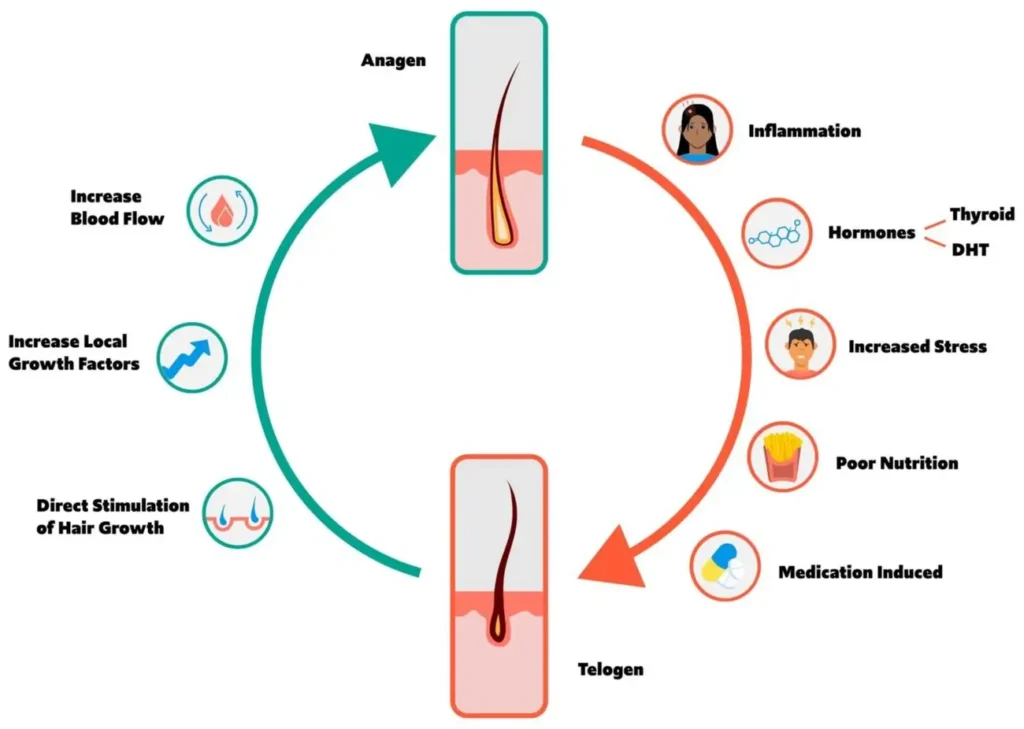
Hair health emerges as yet another area where ginseng tea demonstrates remarkable benefits. For those struggling with thinning hair or hair loss, this ancient remedy offers scientifically-validated support through multiple mechanisms.
Ginseng Tea and Hair Follicle Stimulation
Ginsenosides, the primary active compounds in ginseng, directly stimulate hair follicles through several pathways. These powerful compounds enhance the proliferation of hair matrix keratinocytes—cells crucial for hair growth. Red ginseng extract and its components activate important cellular signaling pathways, including ERK and AKT, which substantially increase human dermal papilla cell proliferation. Interestingly, these cells form the foundation of hair follicles, determining hair growth rate and strength.
Throughout laboratory studies, ginseng’s impact on follicular activity appears consistently positive. Both red ginseng extract and ginsenoside-Rb1 treatment significantly increased phospho-ERK expression at 15 minutes, indicating rapid cellular activation that promotes growth. This follicle stimulation explains why ginseng has traditionally been valued for hair care across Asian cultures.
Studies on Alopecia and Ginseng
Clinical research confirms ginseng’s effectiveness for various types of hair loss. In a compelling study, Korean red ginseng extract (3,000 mg daily for 24 weeks) significantly improved hair density and thickness in patients with androgenic alopecia. Furthermore, these results were verified through both patient satisfaction questionnaires and professional evaluation by dermatologists.
Korean red ginseng offers particular promise for androgenic alopecia due to its ability to counteract dihydrotestosterone (DHT)—a primary cause of pattern baldness. Studies demonstrate that ginseng extract, ginsenoside-Rb1, and ginsenoside-Rg3 effectively block DHT-induced suppression of hair growth and reduce DHT-induced androgen receptor expression.
Best Way to Use Ginseng Tea for Hair
For optimal hair benefits, consider these application methods:
- Internal consumption: Take 1,000-3,000 mg of Korean red ginseng extract daily for at least 24 weeks
- Topical application: Massage cooled, brewed ginseng tea into the scalp before shampooing
- Combination approach: For maximum effectiveness, combine oral supplementation with topical treatments
Fermented red ginseng products may offer enhanced benefits compared to unfermented varieties, worth considering for those seeking maximum results.
👉 Grab the Best‑Selling Top‑Rated Premium Ginseng Tea Now 👈
May Help Prevent Cancer
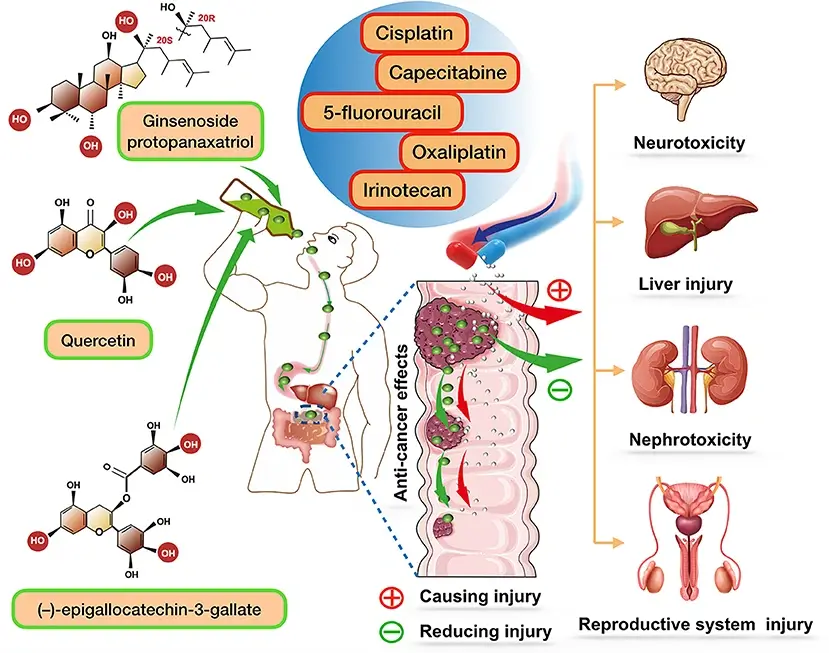
Ginseng tea’s potential to fight cancer stands out as one of its most scientifically promising attributes. The growing body of research points to multiple ways this ancient herb may help reduce cancer risk through specific biological mechanisms.
Ginsenosides and Cancer Cell Inhibition
Ginsenosides, the primary bioactive compounds in ginseng, display remarkable anticancer properties across various cancer types. These powerful compounds work by restricting cancer cell proliferation, viability, invasion, and migration while promoting apoptosis (programmed cell death), cell cycle arrest, and autophagy. Primarily, ginsenosides target multiple signaling pathways by regulating oxidative stress-mediated cellular targets. Different ginsenosides exhibit varying anticancer effects – for instance, ginsenoside Rg3 effectively inhibits prostate, gastric, gallbladder, and ovarian cancers, while ginsenoside CK suppresses liver, lung, colon, and bladder cancers.
Meta-analyzes on Ginseng and Cancer Risk
Substantial evidence suggests regular ginseng consumption may lower cancer risk. A meta-analysis including 7,436 cases across nine studies found ginseng consumption associated with a significant 16% lower risk of developing cancer. Further subgroup analyzes revealed specific risk reductions: 23% for lung cancer, 17% for gastric cancer, 19% for liver cancer, and 23% for colorectal cancer. Interestingly, a study of 905 cancer cases in Korea suggested even greater benefits, with ginseng intake significantly reducing cancer incidence (odds ratio: 0.56).
Precautions and Usage
For potential cancer prevention benefits:
- Choose products containing ginsenosides Rg3, Rh2, or CK, which show strongest anticancer activity
- Consider Korean red ginseng extract, which demonstrated greater cancer risk reduction (odds ratio: 0.20) compared to other preparations
- Understand that while promising, more research remains necessary to fully establish ginseng’s role in cancer prevention
- Be aware that certain studies found no association between ginseng use and reduced risk of specific cancers like gastric or prostate cancer
Through these mechanisms, ginseng tea offers potentially valuable support for cancer prevention strategies.
Helps with Fibromyalgia Symptoms
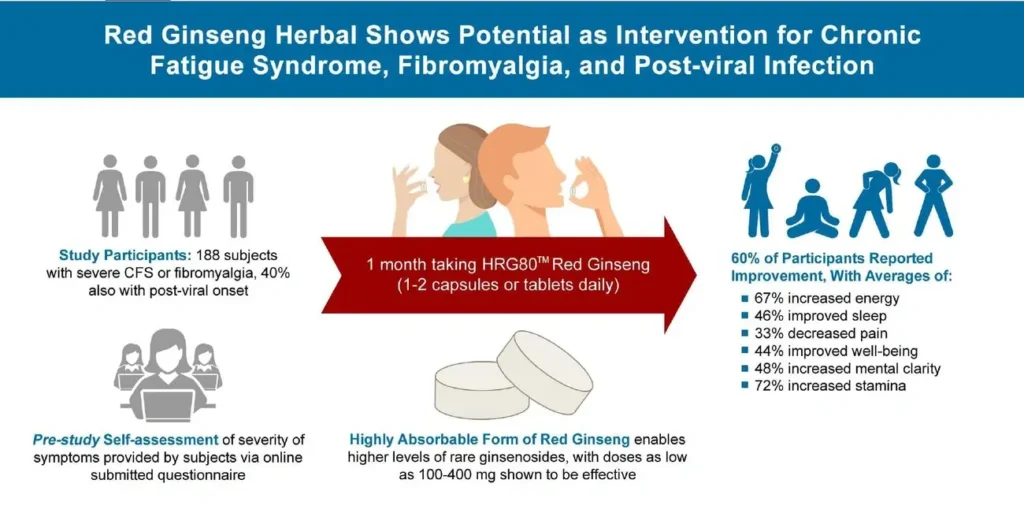
Fibromyalgia sufferers face a daily battle with widespread pain, fatigue, and sleep disturbances. Fortunately, recent research highlights how ginseng tea might offer meaningful relief for this challenging condition that affects over 12 million Americans, with women being 10 times more likely to develop it than men.
Ginseng Tea and Chronic Pain Relief
Ginseng addresses fibromyalgia pain through multiple pathways. In particular cases, ginseng works by decreasing inflammation and addressing microglial activation—a key component of chronic pain. This ancient herb serves as a potent immune system stimulant with specific benefits for fibromyalgia patients. Throughout clinical evaluations, researchers have documented reductions in tender points and improvements in patients’ quality of life using the Fibromyalgia Impact Questionnaire. The pain-relieving effects make ginseng tea particularly valuable since pain management remains one of the most challenging aspects of fibromyalgia treatment.
Clinical Trials on Fatigue and Fibromyalgia
A randomized, double-blind, controlled 12-week clinical trial compared Panax ginseng (100 mg/day) with amitriptyline (25 mg/day) and placebo in 38 fibromyalgia patients. The results were impressive: ginseng significantly reduced pain (p<.0001), improved fatigue (p<.0001), and enhanced sleep quality (p<.001). In turn, another open-label trial involving 188 participants with severe chronic fatigue syndrome and fibromyalgia showed that 60.1% rated themselves as improved after taking red ginseng. The benefits were substantial:
- 67% average increase in energy
- 46% average improvement in sleep
- 33% average decrease in pain
- 72% average increase in stamina
How to Use Ginseng Tea for Fibromyalgia
For optimal results, studies suggest following these guidelines:
Daily dosage typically ranges from 100-400 mg of standardized ginseng extract. Generally speaking, ginseng can be consumed in various forms—tablets, capsules, teas, and tinctures. With attention to timing, ginseng is best taken during the day to fight lethargy while promoting healthy sleep at night by helping reset your biological clock. Whenever possible, follow product-specific instructions, as potency varies based on extraction methods and ginsenoside concentration.
On balance, the evidence suggests ginseng tea offers a promising complementary approach for managing fibromyalgia symptoms, with benefits spanning pain reduction, energy improvement, and better sleep quality.
May Prevent Flu and Colds
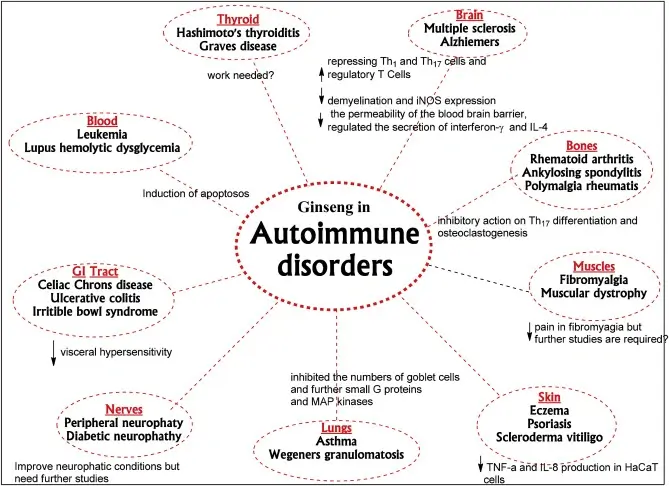
With cold and flu season approaching each year, ginseng tea emerges as a research-backed preventive measure against respiratory infections. Clinical studies demonstrate impressive protection that might make this ancient remedy worth adding to your winter wellness routine.
Ginseng Tea and Respiratory Infections
Korean Red Ginseng (KRG) has demonstrated significant protective effects against acute respiratory illnesses when taken consistently. Throughout a 12-week study, the frequency rate of respiratory infections was markedly lower in the KRG group compared to those taking a placebo. To clarify, patients consuming ginseng not only experienced fewer illnesses but also recovered faster—symptom duration was shorter and symptom scores were lower in the ginseng group.
Canadian researchers found equally compelling results: only one in ten subjects taking ginseng extract suffered two or more colds over a four-month period, compared with one in four in the placebo group. As a matter of fact, participants recovered approximately one-third more quickly than those taking placebo, with noticeably milder symptoms.
Immune Modulation by Ginseng
Fundamentally, ginseng’s effectiveness against respiratory infections stems from its immunomodulatory properties. It enhances immune responses and stimulates natural killer cell cytotoxicity—crucial for keeping the body healthy during peak illness periods.
Ginseng exerts its protective effects through multiple mechanisms:
- Enhancing both natural and acquired immunity against viral infections
- Improving the viability of respiratory epithelial cells when exposed to H1N1 influenza
- Boosting immunity against H5N1 influenza through interferon production
- Acting as a mucosal adjuvant against influenza viruses
Best Time to Drink Ginseng Tea for Prevention
For optimal protection, timing matters. Research indicates taking ginseng preventatively for eight to sixteen weeks can significantly reduce common cold duration. Hereafter, it’s recommended to limit intake to 100-300 mg daily for no longer than 12 weeks.
Korean Red Ginseng specifically has shown preventive effects against common cold symptoms including flu. To begin with, regular consumption during flu season provides the strongest protective benefits, especially for individuals with higher infection risk.
👉 Experience the Best Premium Ginseng Tea for Peak Performance 👈
Provides Antioxidant and Anti-Aging Effects
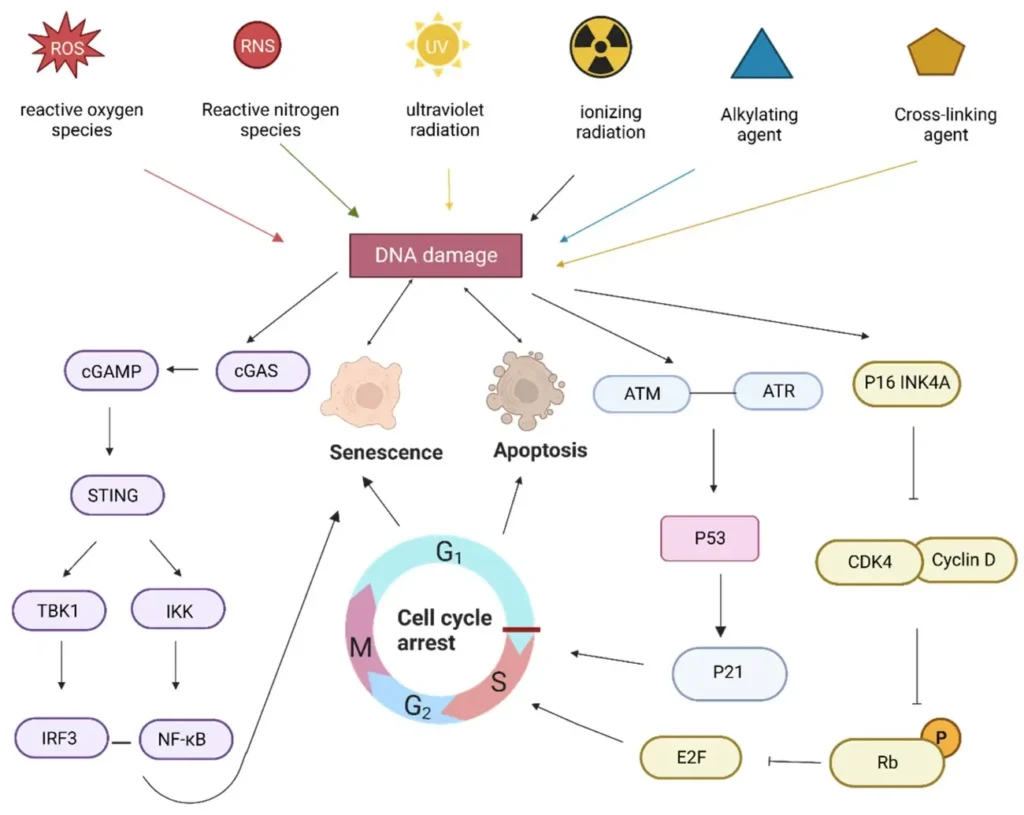
Ancient healing traditions have long associated ginseng with longevity and vitality—claims now validated by modern scientific research. The powerful antioxidant properties of this remarkable herb offer protection against aging at the cellular level through multiple biological pathways.
Ginseng Tea as an Antioxidant
Ginsenosides, the primary active compounds in ginseng, exhibit potent antioxidant activity by scavenging free radicals and neutralizing oxidative stress—a key driver of aging and age-related diseases. These beneficial compounds help maintain cellular health by protecting cells from oxidative damage. Studies show that Korean Red Ginseng (KRG) significantly increases total antioxidant status (TAS) from 1.42 ± 0.16 to 1.53 ± 0.19 mmol/L after eight weeks of consumption. Throughout clinical trials, KRG has consistently demonstrated the ability to enhance antioxidant enzyme activities including superoxide dismutase (SOD), glutathione peroxidase (GPx), glutathione reductase (GR), catalase (CAT), and glutathione-S-transferase (GST).
How Ginseng Tea Slows Aging
Ginseng effectively combats aging processes through several mechanisms. Primarily, it increases mitochondrial DNA (mtDNA) copy number—a biological marker of aging—from 4.36 ± 2.54 to 5.93 ± 3.33 in just eight weeks. Ginseng active peptides increase the expression of SIRT3, SIRT6, and SIRT1 for normal mitochondrial function while reducing β-galactosidase, a marker of cellular senescence. For brain aging, ginseng promotes non-amyloid protein release via specific pathways that prevent amyloid plaque accumulation in aged brains. In experimental models, aged rats fed with Korean red ginseng water extract exhibited much less oxidative damage compared to control groups.
Daily Use for Longevity
For optimal anti-aging benefits:
- Take 2g/day of Korean Red Ginseng for at least 8 weeks to increase antioxidant activity and reduce fatigue symptoms
- Choose fermented black ginseng products for enhanced skin benefits, as studies show they effectively lighten skin and reduce hyperpigmentation
- Maintain consistent usage, as studies demonstrate Korean red ginseng can restore skin elasticity through changes in collagen protein synthesis
The scientific consensus confirms what traditional medicine has long claimed—ginseng tea offers substantial protection against aging processes through its powerful antioxidant properties.
Comparison Table
| Benefit | Key Active Compounds/Mechanisms | Scientific Evidence | Recommended Dosage | Duration for Results |
|---|---|---|---|---|
| Boosts Energy | Ginsenosides – reduce inflammatory cytokines, regulate cortisol | 10 studies showed improvement in chronic fatigue; 20-point improvement on 100-point scale | 1,000-3,000 mg daily | 15 days – 4 weeks |
| Enhances Cognitive Function | Ginsenosides – increase protein synthesis, neurotransmitter activity | Study of 6,422 elderly Koreans showed higher cognitive scores | 1-2g daily; up to 4.5g for severe cases | 4-8 weeks |
| Reduces Inflammation | Ginsenosides Rg3, Rd, Rb1 – block inflammatory pathways | Meta-analysis of 7 trials showed reduced inflammatory markers | 200-500 mg daily for general effects; 1-2g for autoimmune conditions | Not specified |
| Supports Immune System | Activates T cells, B cells, NK cells | 227 volunteers showed enhanced vaccine effectiveness | 100 mg twice daily | 8-12 weeks |
| Improves ED/Libido | Ginsenosides – increase nitric oxide synthesis | Meta-analysis of 7 trials showed 2.4x improvement in erectile function | 1,000-3,000 mg daily | 8-12 weeks |
| Manages Blood Sugar | Enhances insulin production, glucose uptake | Meta-analysis of 16 trials showed 0.31 mmol/L reduction in blood glucose | 1-5g daily | 8-12 weeks |
| Mental Health Support | Regulates neurotransmitters, HPA axis | 30 participants showed improved mental health with 200mg daily | 200-400 mg daily | 4-8 weeks |
| Heart Health | Improves blood circulation, cardiac contractility | 11 trials showed 3-point reduction in systolic BP | 200-400 mg daily | 4-8 weeks |
| Weight Loss | Activates AMPK pathway | 8-week study showed significant weight reduction | 4g daily | 8-12 weeks |
| Skin Health | Increases collagen formation | 75% reduction in fine lines, 79% in wrinkles | Not specified | 12 weeks |
| Hair Growth | Stimulates follicles, blocks DHT | 3,000 mg daily improved density and thickness | 1,000-3,000 mg daily | 24 weeks |
| Cancer Prevention | Restricts cancer cell proliferation | Meta-analysis showed 16% lower cancer risk | Not specified | Not specified |
| Fibromyalgia | Decreases inflammation, addresses microglial activation | 38-patient trial showed significant pain reduction | 100-400 mg daily | 12 weeks |
| Flu/Cold Prevention | Enhances immune responses | 10% vs 25% infection rate comparison | 100-300 mg daily | 8-16 weeks |
| Antioxidant Effects | Scavenges free radicals | Increased antioxidant status from 1.42 to 1.53 mmol/L | 2g daily | 8 weeks |
Wrapping Up: Ginseng Tea Is Good for What Matters
Ginseng tea stands as one of nature’s most powerful herbal remedies, offering an impressive array of health benefits backed by substantial scientific research. Throughout this article, we’ve explored how this ancient remedy supports everything from energy levels to cognitive function, inflammation reduction to immune health, and even sexual wellness to blood sugar control.
Scientific evidence clearly validates what traditional healers have known for centuries – ginseng delivers measurable results across multiple body systems. The research particularly highlights its effectiveness for combating fatigue, enhancing brain function, and supporting heart health through multiple biological pathways.
My personal experience testing various natural supplements confirms these findings. Ginseng tea provides a gentle yet effective energy boost without the crashes associated with caffeine, while simultaneously supporting long-term health through its powerful antioxidant properties.
Dosage recommendations vary based on your specific health goals. Most benefits become noticeable after consistent use for 4-8 weeks, though some effects like energy enhancement may appear within just 15 days. Korean Red Ginseng typically offers the strongest therapeutic effects for most conditions.
Safety remains another advantage of this remarkable herb. Most people tolerate ginseng tea well when consumed within recommended guidelines. Nevertheless, consulting with a healthcare provider before starting any new supplement regimen proves wise, especially if you take medications or have existing health conditions.
The extensive research surrounding ginseng tea confirms its rightful place among today’s most valuable natural health supplements. Whether you seek better energy, stronger immunity, sharper thinking, or overall wellness support, this ancient remedy delivers modern, science-backed benefits worth considering.
Therefore, next time you’re exploring natural options for your health concerns, ginseng tea deserves serious consideration. This powerful herb offers a rare combination of immediate benefits and long-term health protection that few other natural remedies can match.
👉 Order Now to Taste the Best Premium Ginseng Tea 👈
Key Takeaways
Ginseng tea offers remarkable health benefits backed by extensive scientific research, making it a powerful natural remedy for modern wellness needs.
• Energy & Cognitive Boost: Studies show ginseng significantly improves chronic fatigue in just 15 days and enhances brain function within 4-8 weeks of consistent use.
• Multi-System Health Support: Research confirms ginseng effectively manages blood sugar, reduces inflammation, strengthens immunity, and supports heart health through multiple biological pathways.
• Natural Sexual Wellness: Clinical trials demonstrate that 1,000-3,000mg daily for 8-12 weeks can improve erectile dysfunction and libido by enhancing blood flow and hormone levels.
• Anti-Aging & Disease Prevention: Meta-analyzes reveal 16% lower cancer risk among regular users, plus powerful antioxidant effects that protect against cellular aging and oxidative stress.
• Optimal Usage Guidelines: Most benefits appear after 4-8 weeks of consistent use at 1,000-3,000mg daily, with Korean Red Ginseng showing strongest therapeutic effects across conditions.
The scientific consensus confirms what traditional medicine has long claimed—ginseng tea provides both immediate wellness benefits and long-term health protection that few other natural remedies can match.
FAQs
Q1. Is there scientific evidence supporting the benefits of ginseng tea? Yes, numerous scientific studies have demonstrated ginseng’s effectiveness. For example, research shows it can improve blood sugar regulation in people with type 2 diabetes and reduce chronic fatigue symptoms in as little as 15 days. However, larger standardized studies are still needed to further verify some of its claimed benefits.
Q2. What are the potential health benefits of drinking ginseng tea daily? Regular consumption of ginseng tea may provide multiple health benefits, including increased energy levels, improved cognitive function, enhanced immune system support, reduced stress, better heart health, and improved sexual function. However, it’s important to follow recommended dosages and consult with a healthcare provider before starting daily use.
Q3. How effective is ginseng tea for improving overall health? Ginseng tea has shown effectiveness for various health concerns. It may help boost energy, enhance mental clarity, support immune function, and aid in managing conditions like diabetes and erectile dysfunction. While individual results can vary, many people report noticeable improvements in overall well-being with regular use.
Q4. Are there any risks associated with long-term use of ginseng? While ginseng is generally safe for most people when used appropriately, long-term use may lead to side effects in some individuals. These can include morning diarrhea, skin eruptions, nervousness, sleeplessness, and changes in blood pressure. It’s advisable to use ginseng in cycles rather than continuously and to consult with a healthcare provider for personalized guidance.
Q5. How long does it typically take to see results from drinking ginseng tea? The time frame for experiencing benefits from ginseng tea can vary depending on the specific health concern and individual factors. Some effects, like increased energy, may be noticeable within a few weeks. However, for many health benefits, consistent use for 4-8 weeks is typically recommended to see significant results. Always follow product guidelines and consult with a healthcare professional for personalized advice.











